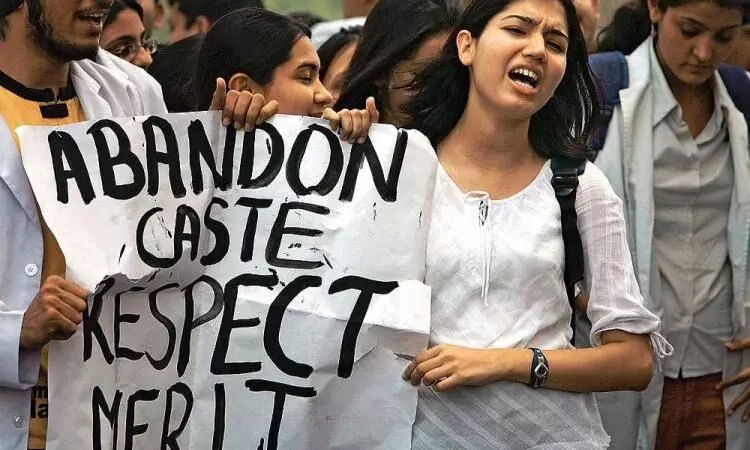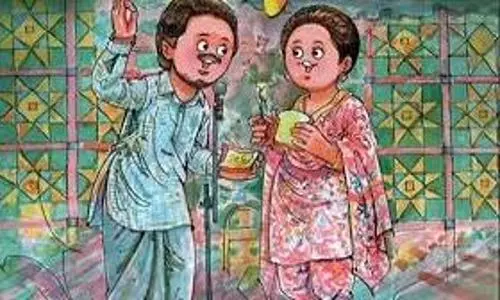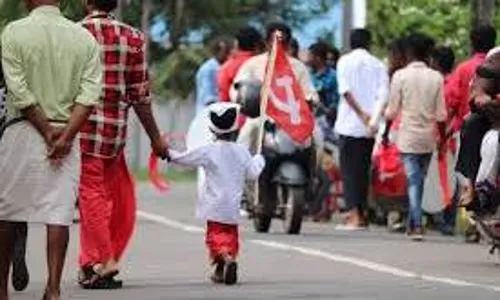

Medical students protest against reservations in New Delhi in 2006 (Photo Courtesy: https://www.forwardpress.in
Three decades after the Mandal: Are social justice parties facing a crisis?
text_fieldsOver three decades ago, the Mandal Commission recommendations were implemented by the then V.P. Singh Government. Given the deep-rooted caste-based inequality in Indian society, making a law to address the social and educational backwardness of a large section of the population was not easy. Even though V.P. Singh Government broke his leg, he finally scored a goal.
To oppose the Mandal Commission recommendations, a small group of upper-caste students, teachers, intellectuals and political forces came to the street. Since the large part of mainstream Indian media has always been a "sacred" domain of the twice-born, it too sided with anti-Mandal forces and projected a small agitation into a "national" cry.
The reactionary forces were busy misleading the upper caste youths. The propaganda was rife that the upper caste youths, after the implementation of 27 per cent reservation, would never be able to get a job. At some places, the anti-Mandal agitators were seen polishing shoes in front of the camera. Some among them were further persuaded to self-immolate themselves. While the innocent suffered, the upper elites were happy to note communalism polarization diluting anti-caste mobilization.
L.K. Advani's Rath Yatra for the construction of the Ram Temple was part of the counter-revolutionary agendas. The Hindutva forces lied and lied that the Babri Mosque was built after demolishing the temple. In the name of 'faith' (astha), they gave an open threat to build a Ram Temple at the very site of the Masjid.
The construction of the Ram Temple at Ayodhya has never been a matter of faith. Rather, it has always been a political agenda, i.e. to capture power by polarizing voters on communal lines. To build the house of the Lord, who is believed to be the Lord of the Heaven, the Hindutva forces kept giving provoking speeches and abusing minorities. In no time, the temple agitation triggered violence in several parts of the country.
The upper caste intellectuals, who had long occupied the liberal institutions and had never been tired of giving lectures and writing books of equality and justice, suddenly realized that they were the first and the last upper castes. Unlike the Hindutva forces, their language was more sophisticated. Yet, they caused severe damage too.
The upper caste intellectuals propagated the myths that the OBC reservation was against the Constitutional principle of equality. The few others opposed it for violating "merit" and negatively affecting administrative "efficiency". Others went on to question caste-based reservation. Finally, the OBC reservation was dragged to the Supreme Court.
The court put the stay on it. Two years after the hearing, the Supreme Court upheld the OBC reservation. No doubt, it was a big blow to the upper caste lobby. Calling reservation necessary for breaking the cycle of social and educational backwardness and poverty, Justice Jeevan Reddy said that.
"it goes without saying that in the Indian context, social backwardness leads to educational backwardness, and both of them together lead to poverty—which in turn breeds and perpetuates the social and educational backwardness. They feed upon each other, constituting a vicious cycle. It is a well-known fact that the administrative apparatus was manned almost exclusively by members of the 'upper' castes until independence. The Shudras, the Scheduled Castes and the Scheduled Tribes, and other similar backward social groups among Muslims and Christians had practically no entry into the administrative apparatus. It was this imbalance which was sought to be redressed by providing for reservation in favour of such backward classes" (cited in Ramachandra Guha's India After Gandhi, Picador India, 2017, pp. 618-619).
Similarly, the Mandal Commission justified OBC reservation on the ground that participation of members from the deprived community in the country's administration sends a positive message among the people that they were too part of the administration and policy-making. In chapter XIII titled 'Recommendations', the Mandal report argues that "It is not at all our contention that by offering a few thousand jobs to OBC candidates, we shall be able to make 52 per cent of the Indian population forward. But we must recognise that an essential part of the battle against social backwardness is to be fought in the minds of the backward people. In India, Government service has always been looked upon as a symbol of prestige and power. By increasing the representation of OBCs in Government services, we give them an immediate feeling of participation in the country's governance. When a backward class candidate becomes a Collector or a Superintendent of Police, the material benefits accruing from his position are limited to his family members only. But the psychological spin-off of this phenomenon is tremendous; the entire community of that backward class candidate feels socially elevated. Even when no tangible benefits flow to the community at large, the feeling that now it has its 'own man' in the 'corridors of power' acts a morale booster" (p. 57).
Three decades after the recommendation of the Mandal Commission, it appears quite; clearly, the social justice political parties are facing a big crisis. The struggles for social justice seem to have been facing several challenges if they have not derailed.
First, 27 per cent OBC reservation has not been fulfilled. Every day the upper caste lobby puts a new hurdle in the path of OBC reservation, while the reservation for EWS for upper castes was implemented within a few days. In class one jobs and central universities, the backward castes are highly under-represented. While the lack of authentic data is underscored to oppose OBC reservation, the central government, working under the upper-caste lobby, is unwilling to carry out a complete caste census. Caste census will demolish several myths and put an end to speculation and lies.
In the last three decades, the Hindutva forces -- with the backing of business, caste and religious networks -- have widened their social base among the deprived communities. They have been largely successful in weakening the unity among the backward castes, Dalits and Adivasis. During an interview on the Mandal Day, August 7, former JD (U) M.P. Ali Anwar rues that the rise of Hindutva forces in Uttar Pradesh is based on the anti-Muslim, anti-Yadav and anti-Jathav plank.
The Hindutva forces had their vested interests in pitting one numerically big caste such as Yadav in Bihar and UP against other small OBC castes. But it is also true that several social justice political parties have been largely reduced to a family or a caste party. The lack of democratization and accountability creating a sense of betrayal among other deprived castes. The BJP then widened that divide.
Several leaders of the social justice parties seem to have abandoned a large part of their ideology. On many occasions, they have tried to beat hard Hindutva with soft Hindutva. They seem to be spending more time appeasing Brahmin and other upper caste voters than visiting the slums of the Dalits. Recently, the five opposition parties comprising the RJD, the Congress, the CPI, the CPI(M) and the CPI-ML wrote "OBC/EBC Hindus" but did not mention "OBC/EBC Muslim" in their letter, a point which Ali Anwar raised. "We have strongly opposed the content of Tejashwi's letter, which his Grand Alliance endorsed. How can they use the phrase 'OBC/EBC Hindus'? How about counting the backward among Muslims? How can about 18 per cent of the population be left out from the discourse of caste census?' Ali Anwar questioned (The Indian Express, August 14, 2021).
In the wake of the upcoming Uttar Pradesh assembly elections, the secular parties compete to project themselves as more "sincere" than the Hindutva forces in building the grand Ram Temple in Ayodhya.
As a result, a big chunk of the religious minorities groups has getting alienated from them. This is not to say that they would not vote for these parties in the elections. But the level of trust and legitimacy has come down.
In their defence of the indefensible, the apologists of the social justice parties in private discussion argue that politics is not run by morality. They further say that capturing power is more important than thinking about how it should be captured. They also justify their stance by saying that they have been deprived of the power corridors for a long. When they join and leave one alliance after another, it is "legitimate" as they have very few "options".
True, they have indeed been betrayed in history, but they cannot run away from the responsibility of putting an end to this unjust order. One is not stopping them from entering the domain of politics and sharing the power. Still, they should always keep in mind that their ability to make policies in the political institutions depends largely on having a powerful social base.
Is not a society where the social and economic inequality is kept depoliticized the real theatre of history?
(Abhay Kumar is a Delhi-based independent journalist and writer. Besides, he teaches Political Science and Urdu. His broad areas of interest include Minority Rights and Social Justice. He can be contacted at debatingissues@gmail.com.)























